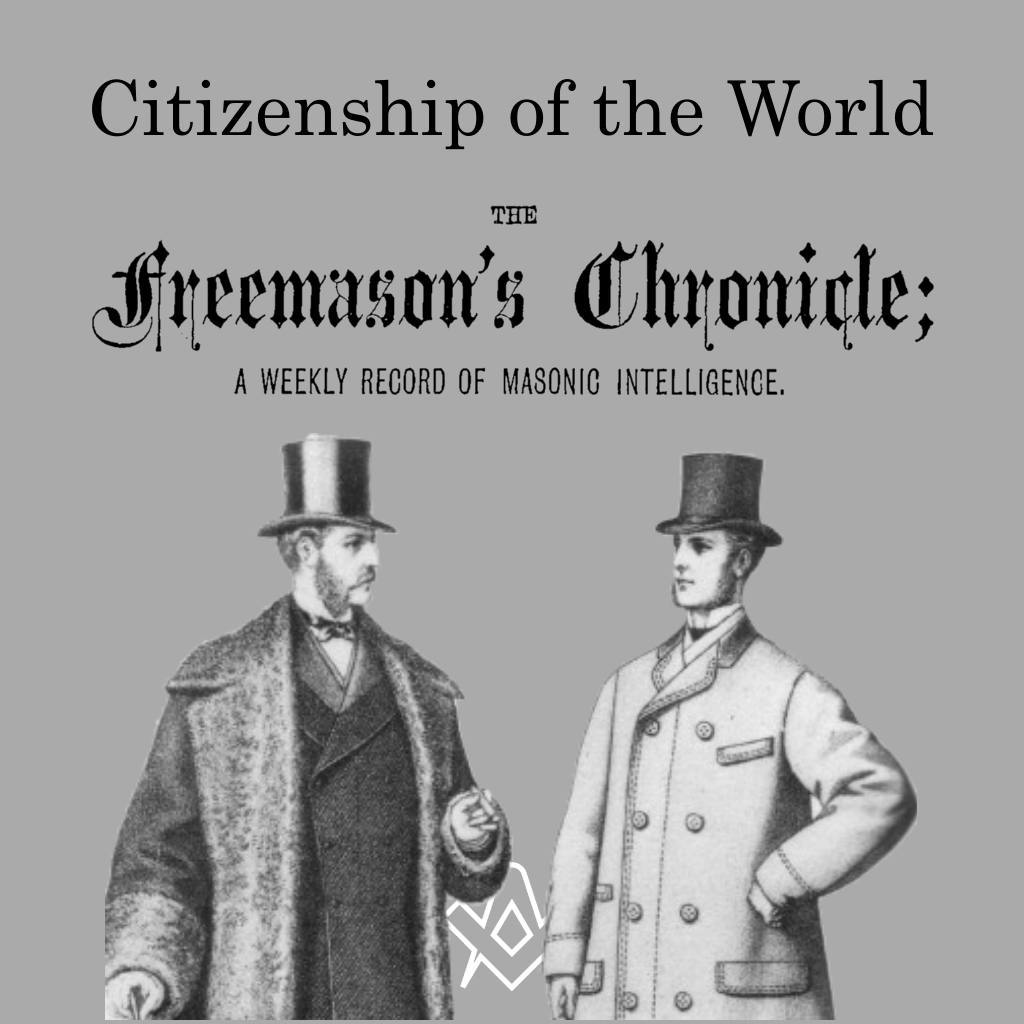“AS wide as the earth; as deep as the human heart.” This is the ideal that some young and enthusiastic minds form of a cosmopolitanism which shall embrace the great human family. Many a man has aspired to be an apostle of cosmopolitanism.
The great traveller, or the lounger, who has sauntered through every capital of Europe, may imagine that because he has seen many countries, or men of many nations, that he is therefore qualified to teach us the true principles of international toleration, or rather citizenship.
Culture and refinement may, indeed, gain by the labours of such men as these; but it often happens that the traveller is a man of narrow ideas, who has gone through the world incapable of justly estimating the facts presented to his mind, while the lounger, who hangs about the saloons of fashion, often knows nothing of men outside his own sphere.
Citizenship of the world was indeed a dream of the young England party a generation ago, and it is rather odd that the gallant young gentlemen, who showed so conclusively that they had “the courage of their opinions,” did not seem to be aware that the principles upon which true cosmopolitanism should be based had long before been expounded by two great corporations, which are destined to influence man while the earth endures.
The first of these is the Christian Church ; the second is the great fraternity of Freemasons.
It is not our business to speak in these columns of religious questions, but no one can deny that the transcendent intellect of Jesus had sketched the principles upon which universal brotherhood should be based more clearly and accurately than any of the great prophets or philosophers who preceded him.
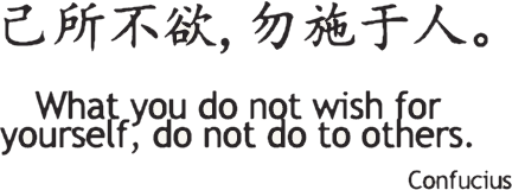
Confucius, the Chinese thinker, did, indeed , make some approach to the golden rule.
Socrates, four hundred years before our era, was clearly on the track which Jesus afterwards pursued, yet he but faintly grasped the noble idea of a brotherhood which should be co-extensive with the human race.
There can be no question that Masonry owes its noblest principles to the founder of Christianity.
Its Charity, its Brotherly Love, its comprehensive grasp of humanity as a whole, were no doubt derived from the Prophet of Nazareth.
Learned writers have, indeed, proved that the Talmud contains an immense body of moral precept, only second in importance to that contained in the Gospels; but these precepts were, so to speak, the private property of a nation, the people of which had no idea of inviting- the whole world to become partakers with them of the measure of truth they enjoyed.
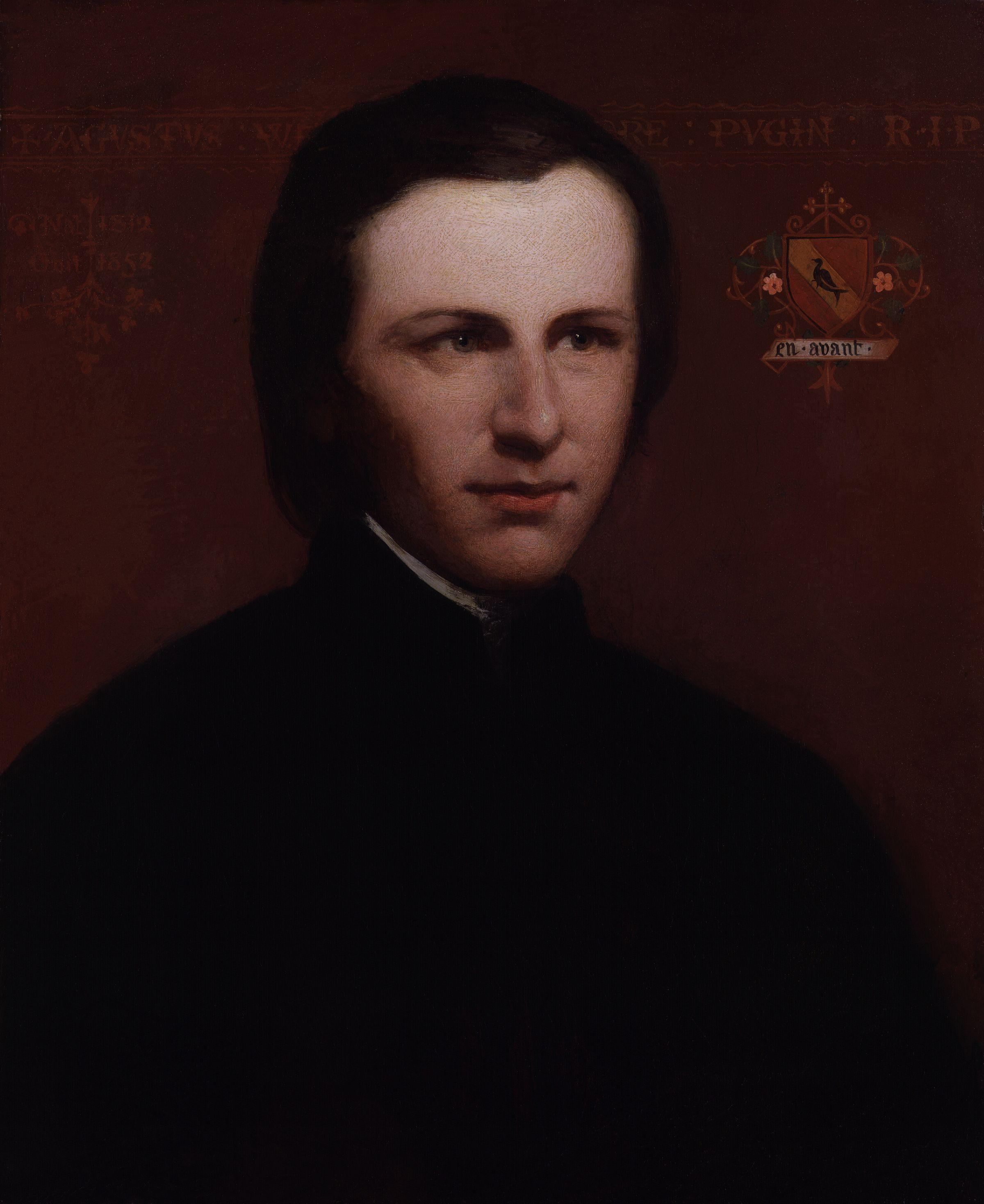
Augustus Welby Northmore Pugin – (1812-1875)
IMAGE LINKED: wikimedia Attribution 4.0 International (CC BY 4.0)
Augustus Welby Northmore Pugin (1 March 1812 – 14 September 1852) was an English architect, designer, artist and critic who is principally remembered for his pioneering role in the Gothic Revival style of architecture. His work culminated in designing the interior of the Palace of Westminster in Westminster, London, England, and its iconic clock tower, later renamed the Elizabeth Tower, which houses the bell known as Big Ben.
Masonry, which dates its foundation far beyond the Christian era, is yet deeply indebted to that marvellous period when Christian art, as Pugin justly called it, flourished, for the breadth and Charity which are its distinctive traits in the present age.
The architects of the great Gothic cathedrals not only spread Masonry over Europe, but they enlarged its moral boundary line.
The eternal truths on which the scientific portion of Masonry is based are no doubt derived from a study of the works of the Great Architect of the Universe; but the grand principles which we are proud to regard as the guiding stars of the Order, the principles of Brotherly Love, Relief and Truth, come from a source nearer to humanity than the manifestations of Divine Power.
A Mason is essentially a citizen of the world.
A Mason is essentially a citizen of the world. Toleration, in its broadest and widest sense, is taught him in the sacred arcanum of the Lodge.
Creed, colour and nationality are nothing to him; but wherever he may roam he recognises the members of the Craft as peculiarly his brethren.
In the presence of such cosmopolitanism as this the boastings of individuals outside the Masonic circle are vain and to trivial.
A man of the world may indeed educate himself regard the people he meets as in some sense related to him by great moral and social tics, but he must be a gentleman, as well as a man of large and liberal ideas, before he can consent to forget the prejudices of his age and country.
It is the Mason who is bound to his fellows of the Craft by that mystic tie which has often been recognised and respected in the heat of the battle, in the midst of plague, pestilence and famine, and at times when political tyranny lies made the confession of the principles of the Order dangerous to the social status, and even the life of the daring brother.
Such citizenship is glorious, and we, in common with the great mass of our brethren, are proud of its responsibilities and its claims.
Extract: The Freemason’s Chronicle – January 16, 1875
 The Freemasons Chronicle, a weekly record of masonic intelligence, was first published 2nd January 1875 London, England as an independent weekly journal of masonic interest and continued for 27 years.
The Freemasons Chronicle, a weekly record of masonic intelligence, was first published 2nd January 1875 London, England as an independent weekly journal of masonic interest and continued for 27 years.
It should be the business of a journal devoted to the interests of the Order to attempt the removal of prejudices such as these, which, though they may have little perceptible influence upon the prosperity of the Fraternity, yet have the effect of preventing timid or ill-informed persons from enlisting under its banner.
It will not only attempt to keep pace with the growing literary requirements of the day, but it will seek to exhibit the Order to the non-Masonic world divested of its technical details, and clothed in the garb of Charity and Brotherly Love.
The questions of the hour, which exercise the minds of thoughtful men, will be handled freely and broadly, without any tinge of political or sectarian bias.
The memoranda of Masonic gatherings which will appear from week to week, will be full and accurate; and as free interchange of opinion is one of the best signs of life and vigour in any society, ample scope will be given for Correspondence on topics of interest to the Order.
If we may venture upon a new rendering of words which recent events have made memorable, we will say here, once and for all, that we will be keen men of business, and will spare no effort, consistent with honour, to achieve commercial success; but first, and before all things, we will prove to our brethren and the world that we are FREEMASONS.
Recent Articles: The Freemason's Chronicle
 Operative And Speculative Masonry Explore the fascinating transition from Operative to Speculative Masonry in our latest post. Discover historical insights from Augustus C. L. Arnold and Rev. Wm. P. Strickland, shedding light on Freemasonry's evolution and its enduring principles. Dive into the rich history and significant milestones that shaped modern Freemasonry. - The Freemason's Chronicle - 2 September 1876 |
 Discover the true essence of Freemasonry, an ancient order founded on the profound principles of love for God and man. It's a call to rise above mere appearances, to embody genuine virtue and benevolence, transcending societal pretense. Embrace the transformative power of simplicity, and let the authentic glories of Freemasonry inspire your path. |
 Discover the intriguing story of a man who became a Mason but openly professed his dislike for the institution. Unravel the peculiar circumstances that led him down this path and explore the unexpected consequences that followed. Dive into this thought-provoking account that challenges our notions of loyalty and reveals the complexities of human nature within the Masonic fraternity. |
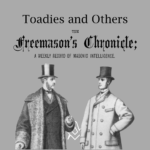 In the realm of Masonry, the principles of equality and respect are paramount. Yet, the presence of toadies—those who obsequiously seek favour from the influential—threatens these ideals. While Masonry embraces diverse beliefs and backgrounds, it rejects the sycophantic behaviours of toadies, flunkeys, and tuft-hunters, urging members to uphold genuine respect and self-worth. The Freemason's Chronicle - 22nd January 1876 |
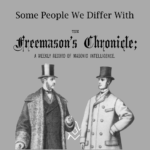 Unveiling the Unpleasant: Some People We Differ With Discover the intriguing dynamics of quarrels within the Masonic brotherhood. From the cantankerous to the litigious, the peevish to the vengeful, delve into the characters that challenge fraternal harmony. Explore their motives, temperaments, and the art of navigating disputes with these fascinating brethren. Brace yourself for a riveting journey into the world of conflicting personalities. |
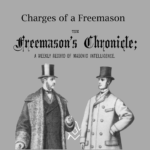 Unravelling the Masonic Mystique: A Deep Dive into the Freemasons' Charges - Explore the intricate world of Freemasonry, its principles, rituals, and the mechanisms for resolving internal disputes. Discover how this ancient fraternity fosters unity, promotes moral conduct, and upholds the sanctity of its secrets, while navigating the complexities of modern society. - The Freemason's Chronicle - 4 December 1875 |
 Unlock the hidden lessons of Masonic Studies! Don't settle for superficial knowledge or mere rituals. Discover the true depth and meaning behind Freemasonry. Expand your understanding of Tracing-Boards, Lectures, and more. Join regular Lodges of Instruction to enhance your Masonic journey. Become a knowledgeable Freemason, not just a token-bearer. Unleash the power of true Masonic wisdom today! |
 Uncover the incredible story of how Masonry saved the life of a Crimean War foot soldier in this historical and masonic account. Through the first hand experience of a soldier engaged in fierce hand-to-hand combat, witness the fateful encounter with a Russian Freemason that changed the course of his life. Learn how brotherhood and a deep dedication to the craft can lead to unforeseen and life-saving circumstances on the battlefield. |
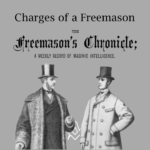 The Freemason's Chronicle - Charges of a Freemason The secrets of Masonry are the exclusive property of the Craft, and can never be communicated to one who is a mere labourer and not an accepted Mason. Hence, no labourer, that is, one who has not been regularly initiated in a legal Lodge. Article first published in The Freemason's Chronicle, 27 November 1875 |
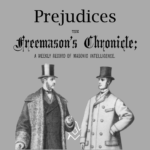 The Freemason's Chronicle - Prejudices Prejudices are partial judgments in favour of, or against certain persons or things, and, for convenience sake, may be ranged in two categories—those which are, comparatively speaking, harmless, and those which are harmful. Article first published in The Freemason's Chronicle, Oct. 2 1875. |
 The Freemason's Chronicle - Cliques Is Freemasonry - a Clique ? Man has been defined as a gregarious animal, but in his highly civilised condition he is gregarious only to a limited extent. First published in The Freemason's Chronicle, Oct. 2 1875, addresses the same challenges then as now. |
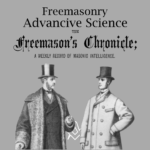 The Freemason's Chronicle - Freemasonry - an Advancive Science Is Freemasonry - an Advancive Science ? Not to confuse advancement with innovation. Has it been the case that Freemasonry's survival for 300 years plus is due to being an Advancive Science, tending to advance. First published in The Freemason's Chronicle 18 September 1875, addresses the same challenges then as now. |
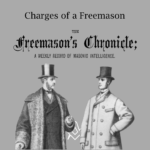 The Freemason's Chronicle - Charges Of A Freemason An interpretation of the "Charges of a Freemason", written Bro. Cornelius Moore and published in 1875, that introduce certain opinions that for some readers, will not sit well in contemporary times. - The Freemason's Chronicle, Sept. 11, 1875 |
 On The Order Of The Temple And Its Doctrine. THE Order of the Temple is divided into two great classes, denominated respectively the Order of the Temple and the Eastern Order. The Eastern Order gave birth to the Order of the Temple, and in the course of time has become an appendage of the latter. It is in ancient Egypt that we find the cradle of the Eastern Order. The Freemason's Chronicle, Sept. 4, 1875 |
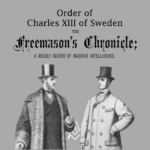 Order of Charles XIII of Sweden The following translation of the Manifesto of King JL Charles XIII of Sweden, on the occasion of his establishing the Masonic Order which bears his name, and of the Statutes of the said Order, may be interesting to our readers. The Freemason's Chronicle, Aug. 28, 1875 |
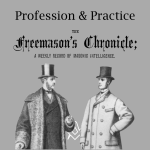 Most of our readers in the course of their experience, have doubtless met with enthusiastic brethren who take it for granted that a Mason can do no wrong. These enthusiasts are thoroughly convinced that the vast majority of those who join the Order are the most benevolent, the most moral, and the very noblest members of society. - The Freemason's Chronicle 10 July 1875 |
 An article investigating the relationship between masonry and citizenship. Are the principles of Freemasonry aligned with the freemason's claim to be a better citizen of the world? The Freemason's Chronicle - 19 June 1875 |
 A visitor must make clear his identity to the satisfaction of the Lodge he proposes to visit. More than once have we been asked to explain our views as to the reception of strangers in a Lodge. - The Freemason's Chronicle - 29 May 1875 |
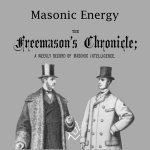 Is there reason in the accusation that Masonic energy looks only to a course of good feeds, when we can point to such grand results as have been achieved in these latter years, both in respect of the extension of our Order ? - 1May 1875 |
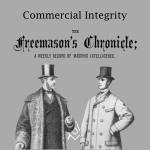 Implementing Freemasonry's peculiar system of morality in our day to day business affairs was the topic of this article, Commercial Integrity, first published in The Freemason's Chronicle - 8 May 1875 |
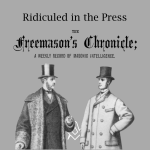 Ridicule has been somewhat illogically described as the test of truth. If it were so, Freemasonry ought to have perished long since. Two press reports from May 1875 covering the |
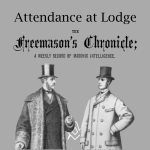 There are many things which Freemasonry will do for a man in the way of opening his mind and giving him larger and kindlier views of life, but Freemasonry itself, cannot eradicate the natural bias of the disposition. |
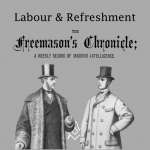 There is, we fear, too marked a tendency in very many Lodges to hasten through its labours, with a view to entering, as soon as possible, upon the business of refreshment. - The Freemason's Chronicle 17th April, 1875 |
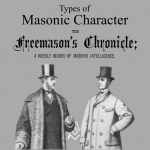 Another example that demonstrates that nothing really changes in Freemasonry. In an article the Types of Masonic Character published 145 years ago in The Freemason's Chronicle 10th April, 1875 |
 A brief history on the relationship between the British Monarchy and the craft - The Freemason's Chronicle 20th March , 1875 |
 What are the qualities of a convivial man and how does this dovetail perfectly in to Freemasonry ? 16th March, 1875 |
 A review of the "Sketch for the History of the Dionysian Artificers," a fragment, by Hyppoli to Joseph Da Costa - This little work may be regarded as, so to speak, the Holy Grail of Masonry. |
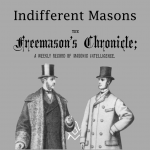 Nothing really changes, an article Indifferent Masons, From Le Monde Maçonnique 1874. Translation published in The Freemason's Chronicle 20th February, 1875 |
 In handling an intruder in the lodge, we endeavoured to show that a good Mason should be a gentleman, and a sincere man. The Freemason's Chronicle 20th February, 1875 |
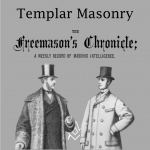 Templar Masonry - a historical aspect of the Religious and Military Order of the Temple published in The Freemason's Chronicle 13th February, 1875 |
 Secrecy perhaps the strongest objection urged by the enemies of the Masonic Order against its existence published in The Freemason's Chronicle 20th March 1875 |
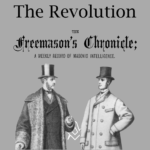 Freemasonry In The United States during And After The Revolution We take a look at Freemasonry in the United States during and after the Revolution first published in The Freemason's Chronicle - February 6, 1875 |
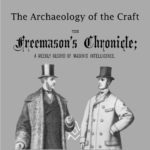 We take a look at the archaeological connection with the Craft, first published in The Freemason's Chronicle - January 30, 1875 |
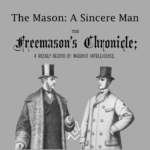 What it means to a Freemason to be a sincere man. Extract: first published in The Freemason's Chronicle - January 23, 1875 |
 What it means to a Freemason to be a citizen of the world ? First published in The Freemason's Chronicle - January 16, 1875 |
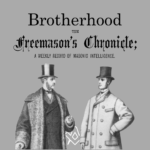 Brotherhood! In that one word what sympathetic associations arise. First published in The Freemason's Chronicle - January 9, 1875 |
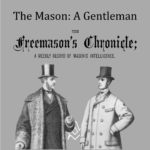 This opening article was written 145 years ago, yet it resonates with Freemasons today as it did then. First published in The Freemason's Chronicle, January 2, 1875, Issue 1 |
masonic knowledge
to be a better citizen of the world
share the square with two brothers

click image to open email app on mobile device



